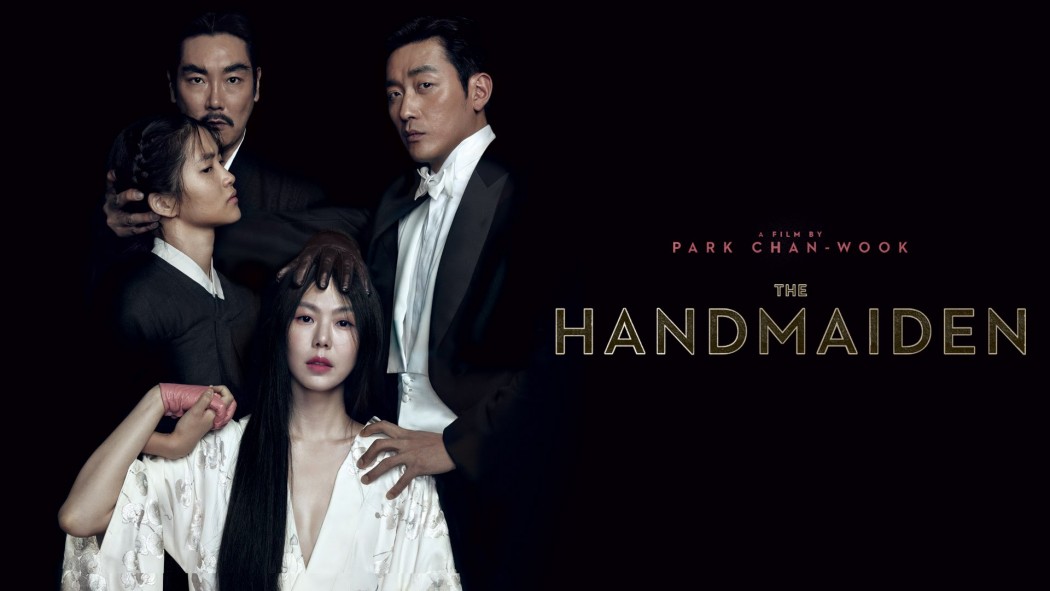Park Chan-Wook, the illustrious Korean director of films such as Old Boy, Stoker, and Thirst, takes on the role of director, producer, and screenwriter in his newest film The Handmaiden. Since Old Boy – an invigorating and stylish tale of revenge sprinkled with humour, brutality, and despair – is one of my favourite films, I did not need much convincing to see Chan-Wook’s latest work.
An adaptation of Sarah Waters’ puzzle novel Fingersmith, The Handmaiden takes place in Japanese-occupied Korea in the 1930s and follows a naive female pickpocket named Sook-hee (Kim Tae-ri) who takes up a position as a handmaiden at the expansive estate of a malevolent book-collector, Kouzuki (Cho Jin-woong). Her goal is to swindle a great fortune from Kouzuki’s psychologically-vulnerable daughter-in-law, Hideko (Kim Min-hee), by getting her to fall in love with a con-man posing as an esteemed duke. Alas, as with any good story, the absurdly complicated project does not go according to plan.
Although on the surface the plot seems to retell a classic love-triangle, the narrative is anything but straight-forward. The complex story of The Handmaiden is executed with overt artistic expression and grounded in truly thought-provoking themes, refreshingly construed through an authentic representation of the female perspective. The result is an absolute masterclass in visual story-telling.
The visual aesthetic paints the narrative intuitively, despite its thorny, dark content. The settings are gorgeous and inviting; for instance, the lush greenery of the estate’s freshly steeped gardens enclose a semi-Victorian, semi-Japanese styled mansion. Moreover, within the mansion, the rooms are elegantly decorated: vast foyers are accented with tasteful wallpaper and burgundy-framed Renaissance-era artworks, various ‘sitting’ rooms are filled tonal antique furniture and imported carpets, and bedroomslook as though they were taken directly from the most luxurious Victorian edition of House and Home magazine.
Equally impressive is the way the very same settings are cast in unsettling lights when the film’s mood calls for it. In these instances, each set is carefully designed and shot for an immersive experience: camera angles make audiences feel as though they are inside the mansion right alongside the protagonists as they navigate the labyrinths. The sense of being present in the story created by the visuals compliments the levels of deception embedded by Chan-Wook’s excellent storytelling. The viewer is constantly skeptical, wondering which observed events are honest, natural exchanges, and which are coy acts of duplicity.
Yet, despite the sense of uneasiness that the film sometimes evokes, the cinematography always projects beauty. If paused at any given moment, each shot would closely resemble a perfectly crafted photograph. Textures and colours complement one another elegantly in times of calm, and violently clash in times of duress. Subjects are arranged in a way that gives a sense of balance to the picture; symmetry and asymmetry are employed in ways that are always visually pleasing. For example, in a scene where the two female leads are making love in the cabin of a ship, both characters kneel on a bed, holding each other intimately. The camera’s placement shows both characters in symmetrical opposition to one another, arranged in an evenly decorated bedroom. Furthermore, the film plays with distance from its subjects—close-ups instill discomfort and puzzlement, long-shots appeal to unfolding action.
Admittedly, I can’t seem to shake the emotion induced when the camera is zoomed into the female leads’ faces. Their expressions evoke an honest sense of connection, while the sheer closeness conjures feelings of alienation, for one is scarcely that close to another person in their own day-to-day experiences.
The complexity of The Handmaiden’s narrative may be dizzying, but the intricacy is justified on the basis of the film’s pacing and rewarding payoffs. Nothing is quite what it seems to be on the movie’s surface, a realization that is teased out by the film’s narrative strategy, which seems to be going over the same confluence of events from differing perspectives. The movie is carefully spliced into three acts, each of which is narrated by a different main character. This strategy allows for the viewer to gain new knowledge on the motivations of each character, revealed by new vantage points on previously seen events, or through the divulgence of withheld facts. Furthermore, Chan-Wook takes his time telling the story, which enables us to pick up on clever sleights of hand previously covered by the film’s lush imagery. Thus, audiences are coaxed to provide reasoning for why certain events unfolded the way that they did, only to find out later on that their theories are totally off the mark.
Despite all of its trickery, The Handmaiden is truly a sensual tale of lesbian romance, and its central themes of moral navigation and homosexuality are explored through a female lens. There is a clear division of good and evil that resembles a battle of the sexes—the women in the story must band together in a love-fueled alliance to escape oppression from their male counterparts. Conversely, the villains, all of whom are male, are ‘trapped’ by their own greed, self-interest, and deviant sexual drives.
Additionally, the film normalizes the idea of homosexual attraction. Chan-Wook structures the romance between the two female protagonists such that their psychological and sexual affections for one another seem pure and genuine, presumably at a time where homosexuality was anything but socially acceptable. Prolonged lesbian sex scenes are not fetishized, but conveyed as erotic and passionate. The same cannot be said for the sex scenes involving male characters, whose occurrences of sexuality are harmfully imposing and objectifying. This all culminates into the driving theme of the film: a push against male-centered oppression, told from the female perspective. Colonial, chauvinistic, and sadist modes of comportment are rejected in lieu of natural female intimacy.
Elegant, captivating, and at times wickedly violent, The Handmaiden is an impassioned story that appeals to gut feelings and ethical sensibilities. Simply put, Chan Wook’s newest effort is gorgeous, thought provoking, and an absolute pleasure to watch.


